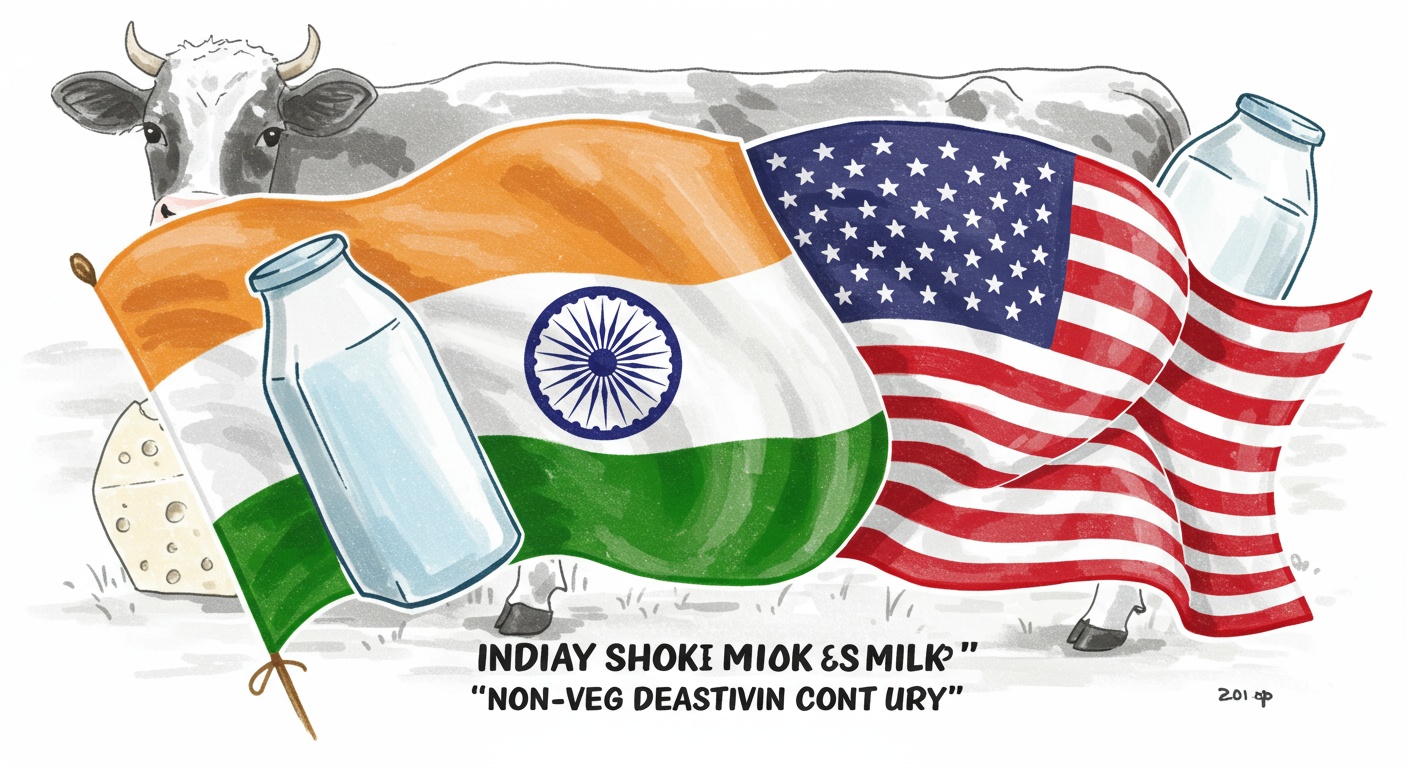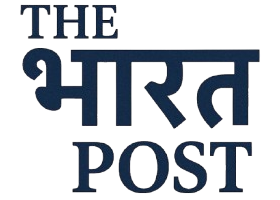India delivers a significant blow to ongoing trade negotiations with the United States, firmly rejecting the import of what it terms ‘non-vegetarian milk’ from American producers. This unexpected refusal introduces a complex new dimension to the critical bilateral trade dialogue, which aims to resolve long-standing disputes and expand market access. The contentious issue centers on India’s strict dietary and cultural norms, particularly concerning the feed given to dairy cattle, sparking a debate over product purity and potentially disrupting the delicate balance of trade discussions between the two global powers.

The Core Disagreement Over Dairy Imports
India has reportedly rejected a key demand from the United States regarding the import of dairy products, citing concerns over the feed provided to cattle. This unexpected development has introduced a new point of contention in the ongoing bilateral trade (व्यापार) negotiations between the two nations. The disagreement centers on India’s long-standing prohibition against the import of dairy products derived from animals that have been fed animal-origin protein, colloquially referred to as ‘non-veg milk’ in the Indian context.
“India’s stance on dairy imports is rooted in deep-seated cultural and religious sentiments that emphasize vegetarianism and the ethical treatment of animals,” stated a senior official from India’s Ministry of Commerce and Industry, speaking on condition of anonymity due to the sensitive nature of ongoing negotiations. “Our food safety regulations, particularly those enforced by the Food Safety and Standards Authority of India (FSSAI), mandate that imported dairy products must originate from animals that have not been fed animal-derived protein. This is a non-negotiable red line for us.”
The United States, a major global dairy exporter, has been pushing for greater market access for its agricultural products in India as part of a broader trade deal. This includes dairy items like milk powder, cheese. Butter. The US industry argues that its dairy farming practices adhere to international standards and that the use of certain animal-derived feeds is a common practice globally.
Historical Context and India’s Stance
India’s position on dairy imports is not new. For decades, the country has maintained strict regulations to align with the dietary preferences and religious sentiments of a significant portion of its population, particularly those who practice vegetarianism. The FSSAI’s regulations on imported dairy products specifically prohibit those from animals fed animal-origin substances, including meat and bone meal. This policy aims to ensure that dairy products consumed in India meet specific ethical and dietary standards. Historically, this issue has been a recurring point of contention in trade (व्यापार) dialogues between India and Western nations. India’s domestic dairy sector, one of the largest in the world, also plays a significant role in shaping these policies, often advocating for measures that protect local producers and uphold traditional practices.
According to a representative from the Indian Dairy Association, “The integrity of our dairy supply chain is paramount. Indian consumers have a strong preference for milk and dairy products from cows and buffaloes raised on traditional vegetarian feeds. Allowing imports that do not meet this criterion would not only violate cultural norms but could also undermine public trust in the dairy sector.”
This stringent requirement has effectively acted as a non-tariff barrier for many international dairy exporters, including the United States, which often utilize a wider range of feed ingredients in their livestock farming.
Implications for Bilateral Trade (व्यापार) Talks
The disagreement over dairy imports poses a significant hurdle to the progress of the broader US-India trade (व्यापार) negotiations. Both countries have been working towards a limited trade deal, often termed a “mini-deal,” aimed at resolving long-standing market access issues, tariff disputes. Addressing the trade deficit. The US has sought concessions in agriculture, medical devices. Digital services, while India has pressed for the restoration of its Generalized System of Preferences (GSP) benefits. The dairy issue, while specific, highlights the deep-seated differences in regulatory approaches and market sensitivities. The refusal to compromise on this point could delay or even derail the conclusion of the desired trade package.
| Area of Disagreement | US Perspective | Indian Perspective |
|---|---|---|
| Dairy Market Access | Seeks open market for all dairy products, citing international standards. | Requires strict adherence to ‘no animal-origin feed’ policy for cultural/religious reasons. |
| Tariffs | Aims for reduction on various industrial and agricultural products. | Seeks restoration of GSP benefits, selective tariff reductions. |
| Digital Trade Rules | Advocates for open data flows, reduced localization requirements. | Prioritizes data localization, national security. Digital sovereignty. |
The inability to bridge this gap on dairy could set a precedent for other sensitive agricultural products, making the path to a comprehensive trade (व्यापार) agreement even more challenging. US trade negotiators have previously expressed frustration over India’s “protectionist” policies. This new sticking point adds to that sentiment.
Stakeholder Perspectives and Economic Repercussions
The decision has elicited varied reactions from stakeholders in both countries. In India, domestic dairy farmers and religious organizations have largely welcomed the government’s firm stance. They view it as a protective measure for their livelihoods and cultural values.
A spokesperson for a prominent Hindu religious organization remarked, “Our scriptures and traditions emphasize a lacto-vegetarian diet. Ensuring that the milk consumed by our populace adheres to these principles is not just a matter of trade. Of faith and cultural preservation. The government’s decision is commendable.”
Conversely, the US dairy industry has expressed disappointment. They argue that India’s policy is scientifically unfounded and acts as an unwarranted trade barrier, limiting opportunities for American farmers.
“The Indian market represents a significant opportunity for American dairy producers,” stated a representative from the US Dairy Export Council. “We believe our products are safe, high-quality. Meet global food safety standards. This specific restriction, based on feed, is unscientific and unfairly disadvantages our producers in a crucial growth market.”
Economically, India’s dairy sector is largely self-sufficient. Imports traditionally account for a very small fraction of its consumption. But, for the US, gaining access to India’s vast consumer base could provide a significant boost to its dairy exports. The current impasse, therefore, primarily impacts the potential for future trade (व्यापार) growth rather than current market dynamics.
The Path Forward: Navigating the Trade Impasse
Resolving the ‘non-veg milk’ issue will require diplomatic ingenuity and a willingness from both sides to find common ground. While India has clearly stated its position, there might be avenues for compromise or alternative solutions. These could include: Certification Mechanisms: Developing a mutually acceptable certification process that verifies dairy products from the US meet India’s specific feed requirements, perhaps through a separate supply chain. Segmented Market Access: Exploring the possibility of allowing US dairy products for specific industrial uses or for niche markets that do not have the same dietary restrictions, though this would likely be complex to implement and monitor. Further Scientific Dialogue: Engaging in more detailed scientific discussions to address India’s concerns regarding feed practices, though the cultural and religious aspects are unlikely to be swayed by scientific arguments alone. The immediate impact is likely to be a prolonged negotiation period for the broader trade (व्यापार) deal. Both nations recognize the strategic importance of their bilateral relationship. Finding a resolution to this and other trade irritants remains a priority. But, India’s firm stance on dairy underscores its resolve to protect its domestic market and uphold cultural sensitivities in the face of international trade pressures.





